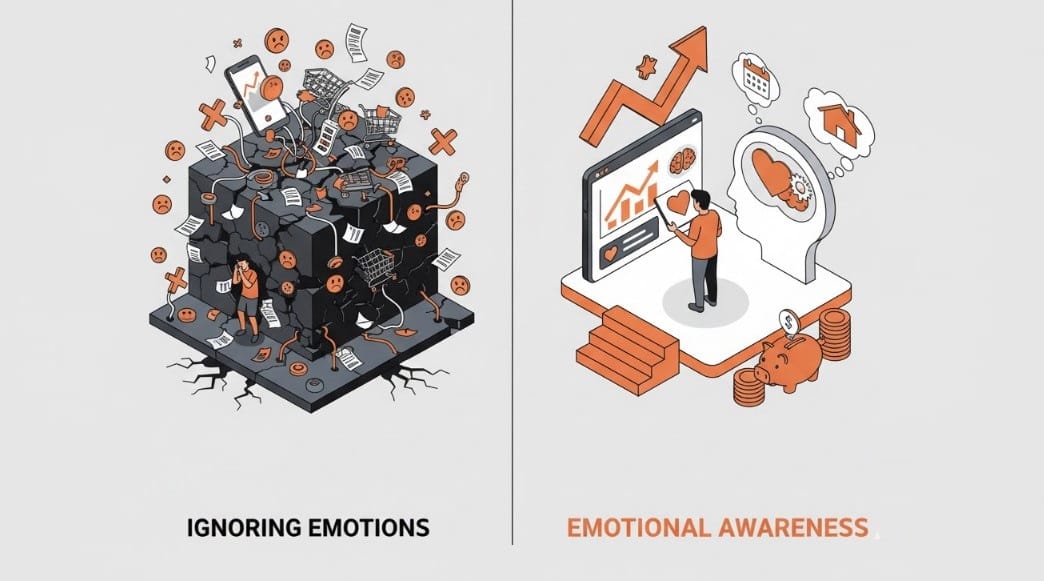Budgeting is often portrayed as a purely logical process: categorize income, assign amounts to expenses, and track spending. But anyone who has tried to stick to a budget knows it’s not that simple.
Emotions play a central role in how we earn, spend, save, and invest. Ignoring them is why most budgets fail.
Understanding the psychology behind money is just as important as the math. Emotional awareness allows you to create a budget that works with your natural tendencies, reduces stress, and encourages sustainable financial growth.
1. The Hidden Role of Emotions in Budgeting
Your emotions influence financial decisions in ways you might not notice:
- Stress and Anxiety: Lead to impulsive purchases or avoidance of financial tasks
- Guilt or Shame: Can cause overspending or avoidance of tracking expenses
- Excitement or Reward-Seeking: Drives discretionary spending without limits
- Fear of Scarcity: Leads to hoarding, over-saving, or under-investing
By acknowledging these emotional triggers, you can design a budget that supports rather than fights against your natural tendencies.
2. Emotional Spending: The Silent Budget Killer
Emotional spending is a major reason budgets fail. Common scenarios include:
- Buying to cope with stress or sadness
- Rewarding yourself impulsively after work or milestones
- Overspending due to boredom or peer pressure
Emotional spending isn’t a moral failing—it’s a human response.
Recognizing triggers is the first step to managing them. Journaling expenses alongside emotions helps identify patterns and weak points in your budget.
3. The Scarcity Mindset and Budgeting Stress
When people approach budgeting from fear or scarcity, problems arise:
- Feeling restricted and deprived
- Experiencing guilt for minor slip-ups
- Giving up on budgets entirely after small failures
Shifting to an abundance mindset encourages flexibility, self-compassion, and consistent progress. Budgets designed with emotional awareness reduce stress and increase adherence.
4. Aligning Budgets with Personal Values
Budgets that ignore emotional and value-based priorities rarely succeed. Ask yourself:
- What matters most to me financially?
- How do I want my money to reflect my values?
- Which spending decisions bring genuine satisfaction versus temporary relief?
When your budget aligns with your values and emotional needs, it becomes easier to follow and more rewarding.
5. Building Emotional Awareness in Your Budget
1. Track Both Money and Emotions
Record not just what you spend, but how you feel while spending. Patterns emerge that reveal triggers and opportunities for improvement.
2. Set Realistic and Flexible Goals
Rigid budgets trigger emotional resistance. Create goals with room for adjustments and discretionary spending.
3. Celebrate Wins
Positive reinforcement strengthens adherence. Reward yourself for milestones, even small ones.
4. Identify Emotional Triggers
Understand the situations, moods, or thoughts that lead to overspending or avoidance. Awareness allows proactive planning.
5. Use Systems Instead of Strict Rules
Automation, templates, and repeatable routines reduce emotional friction and prevent decision fatigue.
6. The Link Between Mindset and Financial Success
Emotional awareness in budgeting isn’t just about sticking to rules — it affects long-term financial health:
- Improves consistency in saving and investing
- Reduces stress and anxiety around money
- Encourages thoughtful, values-driven spending
- Enhances financial decision-making and discipline
A budget that respects your emotions supports sustainable wealth creation.
7. Common Mistakes When Ignoring Emotions
- Overly rigid budgets: Lead to guilt and eventual abandonment
- Ignoring emotional triggers: Allows hidden spending to derail goals
- Comparison-based spending: Influenced by peers rather than personal priorities
- Neglecting self-reward: Reduces motivation and adherence
Emotional awareness corrects these mistakes, making budgets effective, sustainable, and psychologically healthy.
8. Practical Tools for Emotionally Intelligent Budgeting
- Financial Journals: Track spending and feelings
- Budgeting Apps with Notes: Document reasons behind purchases
- Mindfulness Practices: Reduce reactive spending
- Automated Transfers: Remove emotional decision-making from savings and investments
These tools help integrate emotional awareness into daily financial routines.
9. Long-Term Benefits of Emotional Awareness in Budgeting
- Stress Reduction: Fewer guilt-driven decisions
- Increased Adherence: Budgets feel achievable, not restrictive
- Better Financial Decisions: Conscious, values-aligned spending
- Sustainable Wealth: Emotional intelligence complements financial strategy
Emotional intelligence in money management is as important as income or investment strategy.
Conclusion
Budgeting is more than math — it’s psychology. Ignoring your emotions is why most budgets fail.
By cultivating emotional awareness, tracking triggers, aligning with values, and creating flexible systems, your budget becomes a tool for clarity, empowerment, and long-term financial growth.
A budget that works with your emotions, rather than against them, creates sustainable wealth, peace of mind, and financial confidence.


